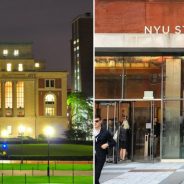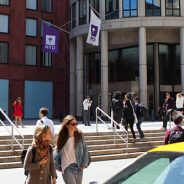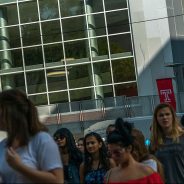Search results for :
The Differences Between a Full-Time MBA in New York City and Toronto
New York and Toronto are the largest cities in the United States and Canada, respectively. Both are major financial and cultural centers, and home to millions of hard-working students, employees, and businesses.
Both metros are also home to a number of quality business schools, each with their own prestigious full-time MBA programs. How do New York and Toronto compare as cities and as destinations for your full-time MBA studies? Let’s take a deeper dive and see.
Location
The most bustling and populous metro in the United States, New York City is is the capital of the business world. More Fortune 500 companies are headquartered here than in any other city. The Big Apple is not only home to Wall Street and the world’s largest financial institutions, but also media, marketing and advertising companies. New York is an enormous city and, unfortunately, expensive to live in, so it may not be for everyone.
When looking at metros with bustling financial sectors and companies, New York is often is the first to come to mind. But how about it neighbor to the north? Toronto is also considered one of the world’s fast-growing financial hubs. An article on the Huffington Post explains how Toronto has risen into the top 10 of the world’s most important financial centers. According to the Global Financial Centres Index from Z/Yen Group and Qatar Financial Centre, Toronto has surpassed Chicago and Boston to become the second-most important financial center in North America, and eighth in the world.
According to one unidentified New York banker quoted in the Global Financial Centres Index survey, “Toronto seems to get stronger and stronger. A number of our rivals have opened up subsidiaries there.”
New York City Full-Time MBA Programs
- Columbia Business School
- Stern School of Business – New York University
- Gabelli School of Business – Fordham University
- Zicklin School of Business – Baruch College
What stands out about these programs?
A Columbia MBA opens up countless career options and is sure to pay off in the long run. The median starting salaries for Columbia MBAs is $125,000, with 34 percent of full-time MBA of graduates being employed in the financial services industry. Students may assemble their own elective tracks, but the school also provides recommend course tracks for students interested in careers in entrepreneurship, healthcare, marketing, media, real estate, value investing, and social enterprise.
Meanwhile, Stern’s MBA curriculum gives students tons of flexibility, and allows degree seekers to choose one or two MBA specializations, NYU allows up to three specializations from 20 plus options. Stern makes sure that all students enrolled in the full-time program are ready for business school: Stern hosts a mandatory two-week orientation program in August called “Launch” as well as a special “Summer Start” program that allows students the school believes may need additional preparation to earn up to six credits before starting courses with their classmates in September.
Both Gabelli and Zicklin’s full-time programs feature cohort-based structures. Gabelli’s program features a New York immersion experience where, over the course of five days, students are exposed to a number of company visits with corporations like Deutsche Bank, Money.net, and Hewlett Packard. As an alternative to completing a major, Zicklin students may pursue a joint JD/MBA in conjunction with Brooklyn Law School or New York Law School.
Toronto’s Full-Time MBA Programs
- DeGroote School of Business – McMaster University
- Ivey Business School – Western University Canada
- Schulich School of Business – York University
- Ted Rogers School of Management – Ryerson University
What stands out about these programs?
DeGroote’s full-time MBA is a 16-month program ideal for candidates who are early in their career and want to gain advanced business knowledge in order to have more job opportunities. McMaster is one of only four Canadian universities ranked among the top 100 in the world, including by premiere publications like The Financial Times.
Ivey’s full-time program stands out because it can be completed in one year. During the year, students will learn business essentials from Canada’s only case-based MBA program. Students are able to experience real-world business scenarios through more than 300 cases a year, providing them of hands-on experience for how to best handle a variety of business scenarios.
The Sculich School of Business full-time MBA program is non-traditional due to its amorphous teaching format: The organization, pedagogy, and style of classes is determined solely by the most effective way to teach a particular course. This means that while some course instructors make extensive use of case studies, others do not. Other approaches to delivering courses include in-class presentations, role-playing exercises and visiting speakers and business leaders.
Schulich’s program, however, is on the more expensive side when it comes to Toronto metro business schools. The current full cost of the program in 2018-19 is $77,900 CAD for Canada residents, and $99,400 for international residents. While the tuition costs are actually higher than the likes of NYU Stern or the Columbia Business School full-time programs, because of the cost of living in New York City, the price is actually negligible—especially for Canadian residents.
Schulich/NYU/Columbia Full-Time MBA Costs
| York/Schulich | NYU/Stern | Columbia Business School |
|---|---|---|
| $57,000 (Canada Residents) | $69,086 USD | $71,544 USD |
| $77,900 (Full Cost, Canada Resident) | $110,562 (Full Cost, U.S. Resident) | $107,749 (Full Cost, U.S. Resident) |
Ryerson’s full-time MBA stands out thanks to its Management of Technology and Innovation (MBA-MTI) program, which provides graduates with skills in problem-solving, critical thinking, communication and collaboration. Despite it’s technical sounding name, the MBA-MTO is not a technical program. Instead students enrolled in this track graduate with the skills needed to manage within companies that are focused on tech and innovation.
Breaking Down the Numbers
Even for those who do not pay extra for room and board, expenses for U.S. residents studying at many NYC business schools will be higher than their neighbors to the north. According to Numbeo, the cost of living in Toronto is 24 percent less than the cost of living in New York City, and rent is nearly 40 percent less.
However, the value of the individual school tends to favor New York City programs over its Toronto counterparts. NYU Stern is currently the 12th overall on the U.S. News & World Report 2018 ranking, with CBS coming even higher at 9th overall. The ranking comparison remains consistent with The Economist as well, with CBS coming in 9th (again), Stern coming in 14th. The highest ranked Canadian program in The Economist ranking—Ivey Business School—came in 59th.
NYC/Toronto MBA Rankings
| School | Financial Times Ranking (2018) | The Economist Ranking (2017) |
|---|---|---|
| NYU Stern | 23 | 14 |
| Columbia Business School | 7 | 9 |
| Ivey | 90 | 59 |
| Schulich | NR | 69 |
The higher rankings and costs tend to, unsurprisingly, have a high correlation with financial output. MBA graduates from higher-ranked NYC metro schools tend to do better in terms of salary and bonuses. As previously mentioned, CBS Class of 2017 MBA grads pulled in a median annually salary of $125,000. Class of 2017 Schulich grads, in comparison, made an average median salary of around $90,000 USD.
For more information on the best full-time programs, check out our New York City and Toronto metro pages.
These LA Business Schools Are Helping Low Income Students Pursue Their Dreams
For many low-income applicants, unfortunately, the cost of an MBA program is just out of reach. That’s because, by the time you count tuition (often upwards of $80,000), boarding and books ($40,000), and other expenditures, the average cost of an MBA is around $140,000 according to Investopedia. And that’s all before you count lost salary for two years for a full-time MBA program.
What can you do?
For low-income MBA applicants in Los Angeles, California you don’t have to give up on your dreams due to money. Instead, business schools offer many options to help pay for your MBA program.
California DREAM Act
The California DREAM Act of 2011 is currently available to California residents who attended and graduated from high school in the state and are enrolled in an accredited California Institution of Higher Education. If you meet these eligibility requirements, you’ll be given access to California State financial aid and scholarships as well as specific university financial aid programs. In addition, need-based graduate applicants are eligible for the State University Grant (SUG) program, which awards up to $7,176 to help cover tuition.
California State University’s Long Beach College of Business Administration is just one of the MBA programs that provides this type of financial aid to low-income MBA applicants. The College of Business Economics at Cal State L.A. also accepts DREAM Act Applications for student financial aid.
Scholarships
MBA scholarships for low-income applicants are one of the best ways to help pay for your degree program. Scholarships vary by school and can range from a few thousand dollars per year to full-tuition coverage plus a stipend.
At the UCLA Anderson School, there are six unique fellowships available to MBA applicants.
- Donor Fellowships are awarded to MBA applicants based on professional development, intended career, community involvement, and/or financial need.
- Merit Fellowships are awarded based on the strength of a student’s application.
- External Fellowships are available for a variety of different situations and students. One example is the Girard Miller Foundation scholarship, which is awarded to a graduate student preparing for a career in state or local government finance.
Teaching Assistantships
For California MBA students, financial aid doesn’t stop in the first year. For second-year full-time MBA students, many Los Angeles business schools offer Teaching Assistantship (TA) positions. These positions are usually awarded to students who keep their grade point averages above a certain level and who apply and receive an appointment. The award amount varies by business school but, in some cases, covers 100 percent of a student’s services fee and tuition.
At UC Irvine’s Paul Merage School of Business, full-time MBA students who gain a TA appointment receive payment for 100 percent of their Graduate Student Health Insurance Program (GSHIP) premium. They also receive 100 percent of the Student Services Fee and Tuition components per quarter.
Military Veteran Aid
For low-income MBA applicants who also have a history of military service, there are many unique financial aid opportunities. The exact services available will depend on the school, but some of these programs are available at schools across California and the U.S.
First, there’s the Yellow Ribbon Program, which many Los Angeles business schools take part in, including Chapman University Argyros School of Business. This program awards MBA students up to $6,000 for tuition and fees. Another program open to military veterans is the Post-9/11 GI Bill, which includes payments directly to the university for tuition and fees, a monthly housing allowance, and an annual books and supplies stipend up to $1,000 per year.
Individual schools like the USC Marshall School of Business also offer their own specific scholarships for military veterans. The Schoen Family Scholarship Program for Veterans is available to full-time MBA students at Marshall and has, to date, provided a staggering $1.2 million in financial support to 173 students at the university.
Loans
Finally, most low-income MBA applicants in Los Angeles are eligible for federal student loans. Direct PLUS Loans are available to graduate students to help pay for educational expenses up to the cost of attendance. MBA students can request unsubsidized loans up to their full eligibility with an Income-Driven Repayment Plan that allows you to make payments based on your adjusted gross income. In most cases, payment will begin until after graduation.
For MBA applicants at Pepperdine University’s Graziadio School of Business and Management, financial aid loan application for Federal Graduate PLUS student aid and Federal Direct Stafford Loans is easy. The school provides loan counseling for graduate student borrowers, loan calculators, and more.
For more information about how your business school could help cover the cost of your MBA program, visit your school website and contact their financial aid office. Scholarships, loans, and aid opportunities vary per school. The Simple Dollar also has a handy guide on how DACA recipients may be able to handle financial expectations for students around the U.S.
Can an MBA Get You a Job With The Historic Coca-Cola Company?
The Coca-Cola Company is among the most famous global companies in existence, with not only profoundly successful sales, but an immense cultural presence. It was, in fact, a 1931 Coca-Cola advertising campaign that was responsible for creating our modern image of Santa Claus (hence the red and white suit). But Coca-Cola’s success extends beyond its legendary advertising campaigns and signature font. According to a 2016 piece in Business Insider, people worldwide drink 1.9 billion servings of the soft drink every day.
For MBAs interested in a global career with a brand that is both established and committed to innovation, Coca-Cola is worth more than a cursory glance. While its headquarters are in Atlanta, Georgia, Coca-Cola MBA careers can be found in Asia, Europe, Latin America, Eurasia, Africa, and other parts of North America.
Why Choose Coca-Cola?
The individual perks of working for the Coca-Cola Company are widespread and unique. In the past, employees have had the chance to compete for tickets to the Olympics and FIFA World Cup (where they would be dutifully covering the events, of course).
When describing their workplace culture, Coca-Cola has said, “We are the brand.” The company’s website states that Coca-Cola’s core values are leadership, passion, integrity, accountability, collaboration, innovation, quality, and diversity. A document the company created in 2009, “2020 Vision: Our Roadmap for Winning Together With Our Bottling Partners,” embodies these tenets. In addition to announcing the company’s goal to double system revenues, it details goals for fostering a collaborative work environment, increasing sustainability, and making a positive contribution to the community.
If you’ve invested in an MBA, naturally, you’ll want to be sure your new job prospects offer a sizable return. Payscale puts the median salary for MBAs working at Coca-Cola at a respectable $97,937. And, with locations in over 200 countries, Coca-Cola certainly does not suffer from a shortage of opportunities.
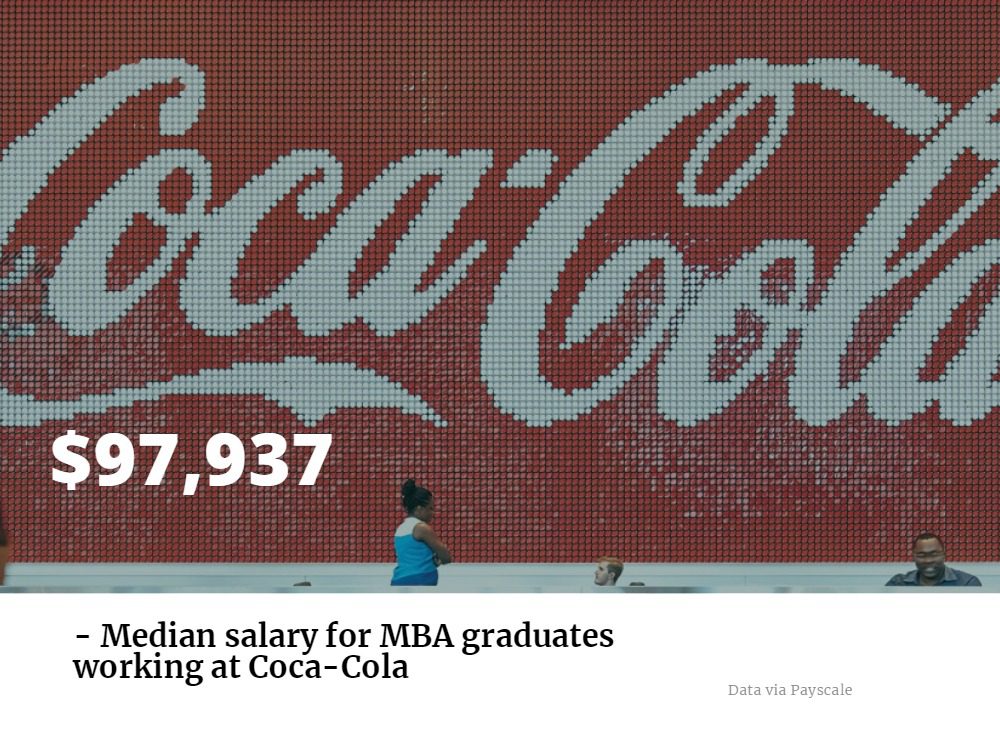
Where Do You Start?
According to Internships.com, “Landing an internship with Coca-Cola is one of the best ways to get your foot in the door and drastically improves your chances of landing a full-time job at the company after graduation.” Coca-Cola offers a variety of paid internships through its University Talent Program. Full-time internships are available for students interested in human resources, sales, product supply, business, and finance. First-year MBAs can apply for the finance internship, which will allow them to work in and observe the company’s finance organization, where they will gain experience in areas like internal controls and supply chain finance. Stand-out interns may be offered a role in the Finance Leadership Program. The two-year program is an immersive look at the finance sector of Coca-Cola that includes a variety of mentoring and networking opportunities.
In addition to internships, MBAs qualify for a number of jobs at the Coca-Cola Company. LinkedIn currently lists ten Coca-Cola job openings for MBAs in just the Atlanta location, let alone the other locations worldwide.
We’ve summarized just a few of the job opportunities for MBAs below.
• Investor Relations Analyst: The Investor Relations Analyst works with the Investor Relations Team to help enact the Investor Relations (IR) strategy, global program, budget, and operating plans. This role requires at least five years of related work experience.
• Global Healthcare Consultant: The Global Healthcare Consultant has a variety of responsibilities, including helping build healthcare programs that span regions across the world, in accordance with Coca-Cola’s global benefits strategy.
• Director of Analytics and Decision Science: The Director of Analytics and Decision Science utilizes data to problem-solve within the company and develop new strategies based on data analysis. Five or more years of relevant work experience is preferred.
How to Ace These 5 MBA Interview Questions
Clear Admit recently explored 5 crucial interview questions you’ll need to know during the height of MBA interview season, based off the site’s in-depth interview guides and archives, which you can read below.
Interviews, interviews, interviews … it’s all anyone seems to be talking about these days, and with good reason. Harvard Business School, Michigan’s Ross School, Chicago Booth, NYU Stern, and UVA Darden are just some of the schools that have already or are in the process of sending out Round 2 interview invitations. Stanford GSB, MIT Sloan, and UPenn / Wharton are among those soon to come.
Instead of driving yourself crazy with worry, why not buckle down and perfect your answers to the questions you are most likely to be asked? To help you prepare, we’ve scoured our Interview Guides and Interview Archive to compile our very own list of five MBA interview questions you need to ace. These questions are among those that most often make their way into MBA admissions interviews at leading schools.
While the questions listed here are most commonly asked as part of blind interviews, they can certainly also come up in the course of non-blind interviews. In those cases, you’ll want to be prepared to go deeper into some of the specific experiences you shared in your application. (Check out our quick refresher on the difference between blind and non-blind interviews).
For detailed insights into each school’s interview process, the questions they ask, and how to tackle those questions, access Clear Admit’s Interview Guides.
5 MBA Admissions Interview Questions You Need to Ace
Walk me through your résumé.
The real trick with answering this open-ended question is to gauge how much detail is too much. Imposing a structure can help. “It’s best to err on the side of brevity,” says Alex Brown, who asked this very question of many hopeful Wharton applicants during his time working in admissions at the Philadelphia school. “Think of this résumé walk-through as simply laying the groundwork for deeper discussion of your background and accomplishments.” A good idea is to develop a two- to three-minute run-through, beginning with where you grew up and went to college, what you studied and perhaps something you enjoy outside of work. Then move into a concise overview of your work experience, beginning with your first job and continuing to present day, making sure to explain why you made the choices you did and what you learned in each major role. “This kind of high-level overview gives your interviewer the perfect opportunity to ask for more detail about specific points if she wants it,” Brown says. If you have a gap of three or more months due to unemployment or some other cause, you should be prepared to address it, Brown warns, although in a short résumé question as part of the interview, it may not come up.
What are your career goals?
With any luck, you will already have a well-honed response to this question, developed and refined as part of the process of writing your application essays. “If you are looking to shift industry or function, this is your chance to explain your reasoning and that you have carefully thought through what may be involved in successfully making the transition,” Brown says. Keep in mind why the adcom is asking this question, Brown suggests. “They want to know how focused you are on the MBA and whether you are in a position to take advantage of the resources business school offers or at risk of getting overwhelmed,” he says. Present a very clear post-MBA goal, Brown recommends. “Schools prefer to admit students who can explain exactly what kind of job they want to pursue beyond graduation and articulate how it will set them up to obtain their long-term career objectives,” he says. Schools are also looking, with this question, to see if your goals make sense and are feasible in light of your past experiences; are you able to articulate a clear path and plan?
Why X school?
Here, schools want to see if you have really done your research on their program and whether you are a good fit with their culture. So, do your research. “I recommend a three-pronged approach to make a truly compelling case for your interest in a given school,” Brown says. Start with academics, he says, naming specific courses and professors that you are interested in. “Remember, your interviewer wants to see that you have really researched the school.” Second, mention specific clubs, conferences and other special programs that will help position you for your career goals. “Even better, show how you would contribute to the school community, such as by organizing an event to share specific knowledge you bring with your future classmates,” Brown suggests. Third, show that you have a good understanding of the school’s community, culture, class size and location and have thought about how these fit with your personality, goals and background. “If you have visited campus or talked with current students or alumni—definitely say so, lead with this.” Brown stresses. “Beyond showing that you’ve invested time in getting to know the school, this also helps your interviewer have a mental picture of you on campus.” he says.
Give us an example of a time you took a leadership role.
The way interviewers ask this question can vary—sometimes you’ll be asked directly about your most notable leadership experience and other times you’ll be invited to describe your general leadership style. “It’s important to keep a few basic principles about leadership in mind,” Brown says. “A leader is someone who has a strong vision or point of view and is able to see things others are not,” he continues. A leader must also have excellent communication skills. Choose an example that demonstrates these points. An ideal leadership example will describe a time when you negotiated with and persuaded key stakeholders, such as clients or a supervisor, to buy into your vision and then delegated the work and managed colleagues or juniors. “If you encountered obstacles along the way, share how you dealt with them,” Brown says. “If possible, you should also show success through quantified results,” he adds. As important as a successful outcome is demonstrating how you drew on the help of others where necessary. “No one is successful on their own,” Brown says. Show that you understand that strong leadership means teamwork and playing well with others, he says.
Tell us about a time you failed.
As tempting as it may be to say that you’ve never failed at anything…that is not what that adcom is looking for here. “In fact, this is a favorite question for those who appear to be ‘rock stars’ on paper,” Brown says. But rock stars make mistakes, and having an example in your back pocket of a time things did not go according to plan can show humility as well as your capacity to learn and grow. “The best answer to this type of question ends with a more recent experience where you took the lesson you learned from the failure and put it into play, affecting a better outcome.” he says.
These five questions certainly don’t cover everything your interviewer is likely to ask you, but they do touch upon some of the things you’re most likely to be called upon to share as part of your MBA admissions interview. You can take some of the anxiety out of the interview process by giving each one some thought, drawing on some relevant experiences from your past, and practicing the responses you would give. Don’t practice too much so that you appear overly rehearsed—since it’s important to seem both authentic and genuine—but prepare enough so that you’ll be ready to truly put your best self forward.
School v. School: NYU Stern or Columbia Business School?
What happens when you pit two of the New York metro’s top business school’s against each other in a head-to-head duel of MBA might? It’s a school vs. school showdown, as we compare Columbia Business School to the Stern School of Business. Let’s take a deeper dive! Continue reading…
Networking Strategies for MBAs Before and After Graduation, Pt. II
The first installment of this series highlighted the fundamental importance that networking plays in a job search and outlined some of its basic strategies. Quick recap: start with friends and acquaintances; present yourself professionally on social media; and remember that the best networks are built from mutually beneficial relationships. This second article offers more nuanced networking tips tailored specifically to MBAs.
One of the best ways for an MBA student to grow their network is simply to volunteer their time. By seeking ways to volunteer in their desired field, one can expand a network by demonstrating their knowledge and experience to others.
Dr. Janis Moore Campbell, Ph.D., the Director of Graduate Professional Development at Temple University’s Fox School of Business, explains that volunteering is a great way to build relationships. “Without fail, others will gravitate to you if you are willing to share your knowledge and expertise. Before, during and after your MBA, strategic volunteering is an outstanding way to showcase one’s knowledge, skills, and generous spirit.”
While it is critical to offer to share your talents, remember that time is a scarce resource. Focus on getting involved in projects that will yield the most benefit. Dr. Campbell notes, “It’s important to think strategically about how best to demonstrate your strengths.”
Current MBA students should take advantage of the resources that their schools provide. Many schools have well established programs that are designed to aid in the process of networking. For example, Beth Briggs, the Assistant Dean in Career Services at the NYU Stern School of Business, points out that in her school’s MBA program, “Students participate in our career education program … which, among other services, helps MBAs become more conversant in their skill sets and personal stories, identify whom it makes sense to network with based on their goals, and then leverage Stern’s relationships and their own contacts to make those connections.” Other MBA schools have similar programs, and they should be thought of as a crucial part of the curriculum.
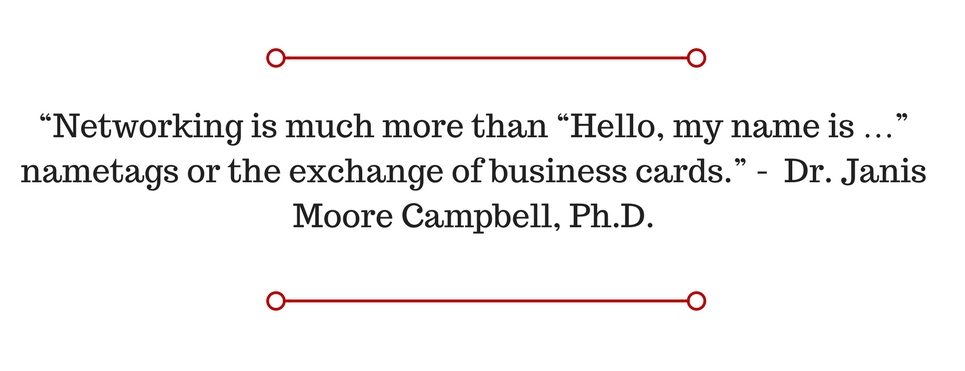
Another key way to capitalize on your school’s assets is to make use of the alumni network. Schools will often facilitate meet-ups between current and former students, and attending alumni events, for example, is a great way to forge new connections. Linking up with your school’s alumni is a crucial part of networking for any MBA student. Stephanie Johnson, Director of MBA/MS Career Services at Drexel University’s LeBow College of Business in Philadelphia recommends, for example, that MBA students should “set weekly goals to attend at least one event and reach out to one to two alumni for informational conversations.” Contacting and talking to past graduates is not just about meeting new people and building your network. Alumni have been in your shoes, and will have essential advice to help you move forward.
Finally, remember that networking does not stop after you have found a job. As Mark Brostoff, Assistant Dean and Director of Graduate Career Services at the USC Marshall School of Business reminds us, “Having a vibrant network of professional contacts is a valuable resource to cultivate and maintain, even after landing the job.” Perhaps the best lesson is that networking is mostly about creating healthy and fruitful partnerships. A strong network is a web made of vibrant relationships, and it is a serious mistake to neglect those bonds. It is also necessary to remember not to spread yourself too thin or to focus solely on networking when finding employment.
“You need not name-drop or be a social butterfly to build a strong network of friends and colleagues” adds Dr. Campbell. “Networking is much more than “Hello, my name is …” nametags or the exchange of business cards.”
So, What is a Strategy MBA and Where Can You Find One?
For those who don’t have a natural knack for strategic thinking, the ability to analyze effectively and make logical decisions can often seem like the kind of skill that just can’t be taught. Luckily, most business schools disagree.
Not only is strategic thinking a skill that can be studied and improved, but an advanced education in this field can lead to a wide array of careers, often incredibly lucrative ones. After all, the ability to make strategic decisions can lead to success in all aspects of business and across numerous industries- that might be why those who earn MBAs in Strategic Management are entrepreneurs, COOs, Department Supervisors, Business Analysts, and are found at any number of high-level management positions.
Whether you are born with the skill or not, pursuing a Strategy MBA is the perfect way to set yourself up for a versatile career in strategic management.
What is a Strategic Manager?
In an ever-changing and often tumultuous business world, an organization’s strategic planner can be a crucial part of their growth and continued success. A career in strategic management or planning will involve keeping an organization on course through the collection, analysis, and organization of information pertinent to the company’s profitability. This may include tracking industry trends, keeping an eye on external business competition or threats, identifying opportunities and creating action plans for a company based on strategic problem solving.
Strategy jobs typically deal in the “big picture” of the company, and are a key part of both shaping and supporting a company’s overall vision and values. The role is a desirable one within a company, as it provides direct access to senior managers and frequently leads to higher level leadership positions.
Strategy jobs require a candidate to use skills from a variety of disciplines, such as finance and marketing. Since these positions are often highly competitive and require candidates to demonstrate a high level of business acumen, earning an advanced degree in strategy is one of the best ways to prove you have the unique combination of skills and drive required for this often demanding—but incredibly rewarding—career.
What Is a Strategy MBA?
Given the breadth of skills required to be a successful Strategic Manager for a company, it’s easy to see why one would want an advanced degree in the field. An MBA specialization in Strategic Management is designed to provide students with a deep grounding within the logic of competitive advantage, focusing on both a broad understanding of business competition as well as a more nuanced training in analysis and decision making.
Offered at some of the top business schools throughout the globe, a Strategy MBA will help set future business leaders on course for careers in strategy consulting, general management, entrepreneurship, and a number of other careers that require the careful skills of analysis and problem solving gained with this degree.
Why Should I Get a Strategy MBA?
With the unique skill set required for a higher-level role in Strategic Management, earning an MBA with a specialization or major in Strategy can be crucial to proving your skill to potential employers. Regardless of your ultimate career goal, the “big picture” type of training offered by a Strategy MBA can be seen as shorthand for a person with the drive and acumen necessary to make crucial business decisions. And graduates with Strategy MBAs don’t always take jobs as Strategic Planners—they are CEOs, entrepreneurs, and other high-level leaders within their organizations.
Those who do earn Strategy MBAs are also often the highest earners among their MBA-holding peers. According to Payscale, Senior Strategy Manager positions can earn salaries of up to $119,000 per year, a large portion of which comes from bonuses, and occasionally, profit sharing. Graduates of Strategy MBA programs are employed at some of the world’s top companies, such as Deloitte, Amazon, and the Intel Corporation.

Where Can You Get a Strategy MBA?
With an increasing demand throughout the years for qualified and experienced strategy planners, a wide variety of business schools—including some of the top ranked MBA programs in the country—have begun to offer MBA specializations in the field of strategy management/planning.
Below are just a few of the MBA programs throughout the United States offering an MBA in Strategy or Strategic Management.
Temple University Fox School of Business
The Fox School of Business at Temple allows MBA students to focus their degree in Strategic Management, or earn a dual degree that combines an MBA with a Master in Innovation Management & Entrepreneurship (IME). The Department of Strategic Management (SGM) at Fox allows students to approach business strategy from four different angles- entrepreneurship, management, consulting, and international business. All for disciplines help prepare students to be leaders within the strategic management field through hands-on instruction, internship opportunities, networking events, travel abroad experiences, and more.
New York University Stern School of Business
The Stern School of Business at NYU allows MBA students to specialize their degree in Strategy, which will help provide a strong business foundation for the business leaders of tomorrow. The degree will help prepare students for a wide variety of fields, including careers in strategic planning, risk management, and management consulting. Courses in strategic management at Stern include: Competitive strategy in the marketplace, corporate governance, strategic design, strategic talent management, and more.
University of Pennsylvania Wharton School of Business
The world-renowned Wharton School at UPenn also offers students the opportunity to earn an MBA in Strategic Management, a major which aims to provide a “deep grounding in the basic logic of competitive advantage premised on a careful analytical treatment of the distinct qualities of positions of individual firms and an understanding of broader competitive dynamics.” Some of the courses offered as part of this major at Wharton include: Deals: the Economic Structure of Transacting and Contracting, Strategic Implementation, Multinational Business Strategy, Competitive Strategy and Industrial Structure, and more
Amazon, Philly Win Super Bowl According to Northwestern Kellogg
Philadelphia football fans took to the streets, toppling cars, scaling street lamps, and setting at least one fire to celebrate their beloved Eagles’ first-ever Super Bowl win, 41 to 33 against the New England Patriots. But according to MBA students at Northwestern’s Kellogg School of Management, e-commerce giant Amazon was the victor in terms of best ads of the night.
On Sunday, as the game got underway in minus-2-degree Fahrenheit Minneapolis, approximately 50 Kellogg students teamed up with marketing professors Tim Calkins and Derek Rucker to determine the night’s winners and losers in the battle of the brands. Advertisers spend more than $2 billion each year and roll out highly anticipated Super Bowl commercial spots in an effort to imprint their brands in the minds of millions of spectators—some wowing and others bombing in the process.

Kellogg students watch commercials during the Super Bowl at the Allen Center Atrium in Evanston, Illinois, February 4, 2018. Photo by Jim Young for Kellogg
Armchair spectators around the world pick their own winners and losers among the ads, but for the 14th year running, Kellogg students applied a unique framework for evaluating an ad’s brand-building potential as part of last night’s 2018 Kellogg School Super Bowl Ad Review. Using the ADPLAN framework to evaluate each ad according to six critical criteria—Attention, Distinction, Positioning, Linkage, Amplifications and Net Equity—the Kellogg students determined the winner of the night to be Amazon with its “Alexa Loses Her Voice” commercial spot. Also scoring highly were Mountain Dew, Doritos, Tide, Avocados from Mexico, and Wendy’s.
Joining the Pats in defeat, according to the Kellogg review, were Squarespace and T-Mobile, which each received “F” grades for least effective advertising during the game.
“Amazon used a cast of celebrities that focused us on the brand, reinforced the equity in Alexa, and ultimately was fun to discuss and share with those around you,” Professor Rucker said in a statement. The Amazon ad included appearances by Cardi B, Rebel Wilson, and Amazon CEO Jeff Bezos. “However, Squarespace and T-Mobile both missed the mark with questionable positioning and unclear calls to action,” continued Rucker.

Kellogg students analyzing Super Bowl ads in real time. Photo by Jim Young for Kellogg
Professor Calkins called attention to two trends that emerged across the big game’s ads—a competitive angle and philanthropy. “As competitive as the game was, the category wars were equally competitive,” Calkins said in a statement. “For example, there was hard hitting competition in the wireless wars with some brands calling one another out,” he noted. In addition to poorly performing T-Mobile, wireless advertisers included Sprint and Verizon, which the Kellogg student review team each awarded “B” grades.
“Many brands tried to appeal to viewers through philanthropic causes, including Toyota, Ram, and Hyundai,” Calkins added. Ram, for its part, sought to sell its trucks using images of people helping others with a sermon given by Dr. Martin Luther King, Jr. as the voice over. The ad concluded with the phrase “Built to Serve” flashed on the screen alongside a Ram logo. Unfortunately for Ram, the social media backlash was fast and furious.
“A Martin Luther King Jr speech to sell @Dodge Ram trucks? Totally offensive #mlk,” wrote one user on Twitter.
Several other tweets expressed similar sentiments:
There was audible painful groaning at the Super Bowl party I’m at as everyone realized Dodge Ram was trying to profit off of an MLK speech
— Hunter Walker (@hunterw) February 5, 2018
Not sure MLK’s dream was to drive a Dodge Ram.
— ItsTheReal (@itsthereal) February 5, 2018
“I have been to the mountaintop. And I got there in a Ram truck.” – MLK
— SportsPickle (@sportspickle) February 5, 2018
The Kellogg student team gave the Ram commercial a “C” grade overall, but Calkins had more to say in an interview with the New York Times. “It’s the wrong mistake to make given everything that’s going on in the U.S. right now,” he told the Times. “There’s so much emotion right now around race in this country that this was a high-risk move, and clearly it’s not going over very well,” he continued.
“I think it was well intentioned, but they’re going to have a lot of explaining to do,” Calkins continued. “They did not release this ahead of time, so they went for the surprise. They got that, but at the same time they now have a big problem with feedback and people being upset.”
Though many on Twitter directed their ire toward Dodge—the Detroit-based car manufacturer founded by two brothers of that name in the early 1900s—the Ram Truck brand was officially separated from the Dodge car brand in 2009 as part of an acquisition by Italian automaker Fiat S.p.A. Its successor, Fiat Chrysler Automobiles, is the current owner of the Ram Tuck brand.
Perhaps some of the confusion around brand will be a boon to Ram’s owner as it attempts to recover from its Super Bowl fumble. As for whether ad champion Amazon will look favorably on football champion Philadelphia as a spot for its future HQ2—another topic of speculation on social media last night—only time will tell. What we do know is that the students at Kellogg will carry lessons learned from advertising’s biggest night along with them into their future careers in marketing.
For the full 2018 Kellogg School Super Bowl Ad Review results, click here.
To learn more about the Kellogg School Super Bowl Advertising Review, click here.
This article was republished with permissions from our sister site, Clear Admit.
The 5 Important Things You’ll Need to Know When Getting an MBA
If you’ve gone through the rigamarole of an MBA application, chances are you’re feeling a bit taxed (no pun intended). Don’t slow down now! Sometimes when you have your life and education under the microscope it’s helpful to get a gentle reminder from a reliable source—like us—of what you hoped to get out of the degree in the first place. Here are a few tips that might help calibrate your b-school compass:
Practice On The Field
Cliff Oxford, founder of the Oxford Center for Entrepreneurs, wrote in the New York Times that certain traditional MBA programs are “like having athletes studying game film but never practicing on the field.” This is why many schools encourage students to apply for internships during enrollment or summer semesters. These opportunities can be competitive—especially if you have your mind set on a large company—but don’t let that deter you.
There are many ways to stay connected with the global marketplace, where you will be employed in only two years. For starters, keep applying and remain alert to positions that may have a greater potential for longevity. Interviews that don’t lead to an internship are still essential experiences. If your chosen program doesn’t have adequate outlets for students to engage with employers, ask for them.
Let A Mentor Set The Pace
Mentorships reinforce the idea that there’s no substitute for experience. For students too intimidated to reach out to a professor, consider that mentorships may be the most rewarding part of their job.
Many schools offer a mentorship program built into the curriculum. Large schools like the University of Oregon and the University of Miami pair students with local professionals to “meet regularly throughout the academic year to discuss everything from study habits to career choices.” Schools have reported that these connections are pivotal for students in achieving their ideal positions and cultivating life-long relationships in the field.
Mentorship is also a staple of the career path designed for students at powerhouse business schools like the Yale School of Management, which recently revamped its WE@Yale program.
Change Your Perspective
When under pressure, remember to give yourself a break. Exercise and meditation are steadfast options, but use your imagination. Jerry Seinfeld reportedly displayed images from the Hubble Space Telescope on the walls of his writing room to calm his nerves. ”I don’t find being insignificant depressing. I find it uplifting.”
Completing your MBA is a personal exploration above all else. Don’t forget your true entrepreneurial spirit while finding your footing. After all, changing ones career is the second most common reason, according to students, that they pursue an MBA in a first place.
Experiment With Electives
Special projects and electives are a chance to step out of your comfort zone. These courses are updated on a yearly basis, meaning that they cover cutting-edge topics that can open up new worlds and help you garner skills that separate you from the rest.
For example, the Stern Signature Project at the NYU Stern Center for Business and Human Rights recently led students to create a business plan “focused on sustainable employment and profit” for a private Kenyan social enterprise.

The NYU Stern Center for Business and Human Rights launched in 2013, focusing on various issues like manufacturing, sustainability, and much more.
Get To Know Your Pack
A drive to succeed doesn’t mean that you have to be the lone wolf on Wall Street. Every MBA program has students who come from unique backgrounds, cultures, and histories. These are your future colleagues. They’re also hidden mentors who may be your most valuable supporters.
Many schools, like the Wharton School at the University of Pennsylvania, actively acclimate their students together with unique Olympic-like events, helping bridge the various cultural gaps of the incoming students. Not only are these events fun, unless you hate being outside or sack races, but they are potentially powerful networking events for you and your peers.
How Fast Can You Earn an MBA?
The process of earning an MBA is an exciting and often transformational time in someone’s life—and for some people, the faster you can get through it, the better.
The benefits of earning an MBA, such as increased post-graduate salary, career advancement potentials, and development of a strong business network, remain true regardless of how long it takes to complete your degree program. Completing your degree quickly just means reaping the benefits faster, while limiting the amount of time without an income.
MBA graduates are a diverse group—not only are they rising business leaders, but they are also parents, community organizers, and working professionals. With so many different types of MBA programs available, such as Online or Accelerated MBAs, students can choose the best program for their busy life and time constraints.
The average time it takes to complete your MBA can vary depending on the school, program, and type of degree. Below, we’ve rounded up the most important information regarding the average program length and schedule for a variety of MBA programs throughout and beyond the United States.
How Fast You Can Earn a Full-Time MBA?
With so many options to truncate the amount of time it takes to complete an MBA, it may seem strange that someone would still choose to pursue a full-time degree. Nevertheless, there are still numerous benefits to pursuing your MBA full time. Among these benefits is the increased opportunity for full-time students to get fully involved in the goings on of their university and business school. From student organizations to case competitions to hands-on experiences, full-time students have committed their full schedule to their business education and most certainly reap the benefits when it comes to skills and network development. Furthermore, taking time off of work to pursue your degree full-time leaves you open for more opportunities- such as traveling for study abroad, business plan competitions or corporate visits- that likely wouldn’t be possible for someone working while they’re in school.
The average full-time MBA degree today typically require around 30-60 credit hours, with variation depending on the program. With the typical course load asking students to take three courses (nine credits) per semester, the average full-time MBA can be expected to be completed in two full years. Most full-time programs begin in August or September and take four semesters for students to complete their required work, earning their degree by May or June of the second year.
Since the number of credits required by a particular program can vary, some full-time MBAs may be able to be completed faster than two years. Whereas programs like the full-time MBA at NYU’s Stern School of Business takes two years and requires 60 credits, a program like the full-time MBA at McMaster University’s DeGroote School of Business can be completed in as few as 16 months.
How Fast You Can Earn a Part-Time MBA?
A part-time MBA is the perfect option for someone who doesn’t want to put their career on hold while they earn a degree. With a flexible and often self-paced schedule, students are able to complete their degree in a time frame that works best for them, with classes typically offered at night or on the weekends.
While the benefits of a flexible schedule are enormous, one downside is that taking less courses each semester will ultimately extend the amount of time it takes to complete your degree. Typically, students pursuing their MBA part-time will earn their degree in three years, but this can vary significantly—not just depending on the program, but the person! For example, the top part-time MBA program at Northwestern University’s Kellogg School of Management can take anywhere from 1.25 to five years to complete.
What About an Accelerated MBA?
It’s right there in the name—the Accelerated MBA is all about earning a quality business education quickly and jumping right back into work. Most accelerated MBA programs can be completed in just twelve months if pursued full-time, or twenty-four months on a part-time schedule.
Of course, completing a degree in this length of time takes an impressive commitment. Unlike other programs that have winter and summer breaks between the semesters, many Accelerated MBA programs have shortened vacation periods and will require students to continue working throughout the summer.
Not every school offers a One Year or Accelerated MBA options, but those that do take these programs seriously and ensure that the same quality education received in a full-time degree program can be provided to students in just one year. Programs like the One Year MBA at Emory University’s Goizueta Business School boast impressive statistics, such as a 5:1 student to faculty ratio and a 93 percent success rate for graduates receiving employment within three months of completing their degree.
Is An Online MBA a Faster Option?
The world of Online MBAs is a diverse one with a wide array of options to choose from. Really, the only commonality between all online programs is where the classes take place—online! These programs provide for maximum flexibility where students can pursue their education from the comfort of their own homes—or wherever the world may take them.
Online MBAs come in all shapes and sizes, but typically require an average of around 30 credit hours. Depending on the university schedule, this can take up to two years to complete. At Temple University’s Fox School of Business, for example, the Online MBA program can be completed in 20 months, and includes a one week long opening residency. Some schools may also offer their part-time or Accelerated MBA programs in an online format. At the Kogod School of Business at American University, their AACSB-accredited online MBA involves 48 total credits but can be completed in just one year.
What About an Executive MBA?
The Executive MBA is a program designed for professionals with several years of work experience under the belt, who are looking for an MBA education to enrich their professional experience and open new career opportunities. Since this degree is targeted towards working professionals, it is typically structured so that students can keep working full-time, taking classes in the evenings and weekends.
On average, Executive MBA programs will take up to two years to complete, though this is typically a very part-time schedule. One of the top ranked EMBA programs in the country is the Executive MBA at Fordham University Gabelli School of Business, which can be completed in 22 months by attending class for one three-day weekend per month.
From your first day of classes to graduation, a world-class business education is typically no more than two years away. However, the flexibility of many programs put the power in the student’s hands: important factors like your schedule, finances, and the impact of taking time off of work should all factor into your decision about what type of MBA to pursue.
How NYC Business Schools Help the Underprivileged Applicants
Pursuing an MBA is a shrewd move for anyone looking to earn a competitive salary right out of school. Though attending a renowned school can up the price tag of earning an MBA, it may also increase the overall return on investment. According to an article in U.S. News & World Report, “… graduates of top-tier business schools usually earn higher starting salaries than their peers who went to lower-ranked schools.”
It’s not jut the opportunity to have a lucrative job right out of school that makes a high starting salary appealing. An enviable starting salary could mean more earning potential down the line. However, a top-tier school may seem out of reach for low-income applicants. After all, how can you enjoy the return on investment if you can’t afford to invest in the first place?
Luckily, many prestigious business schools offer resources for students from different socioeconomic backgrounds. Below, we’ve outlined the resources available for low-income applicants at five of New York City metro’s best business schools.
How NYC Business Schools Help the Underprivileged
Columbia Business School
Columbia Business School offers need-based awards to many students, which may result in anywhere from $7,500 to $30,000 in tuition support. Nearly half of applicants receive need-based scholarships, which are automatically renewed at the start of the second year. Columbia students can also apply for private and federal loans. To create incentive for students to choose careers in public and nonprofit fields, the school offers a Loan Assistance Program for students who utilize their education to pursue these paths. Students are eligible to apply for this program for up to five years after graduation. Depending on the extent of students’ debt, they may receive anywhere from $2,000 to $10,000 of annual support. Columbia students may also receive merit-based scholarships, such as the Columbia Fellows Program, which may cover full or partial tuition and is granted to applicants with an outstanding track record in leadership and creativity.
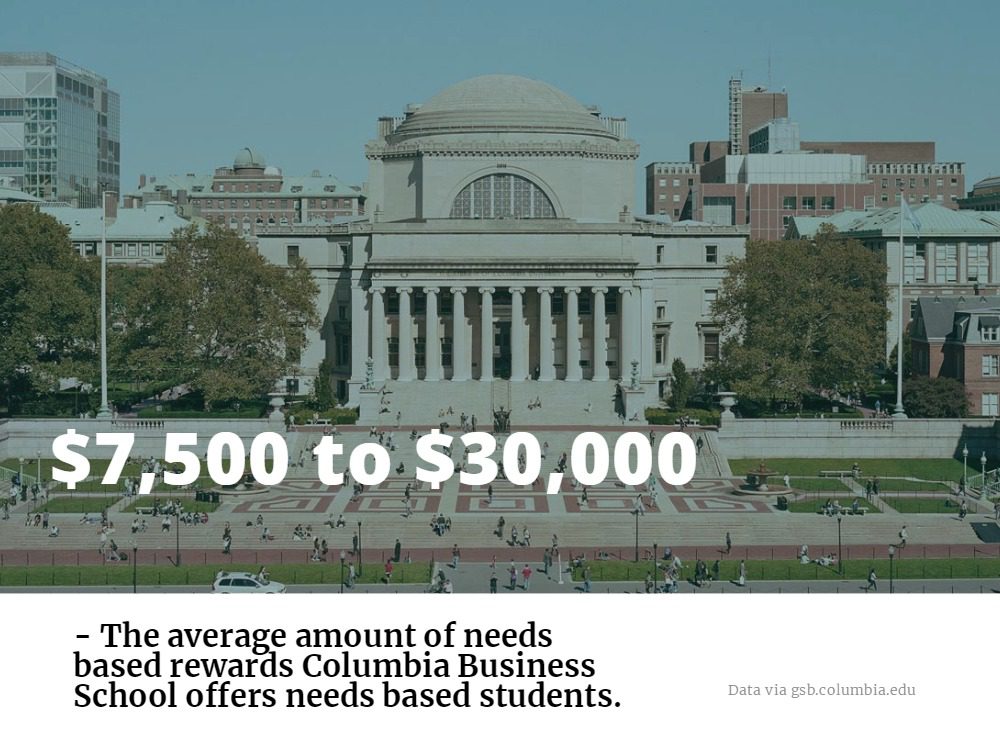
Stern School of Business—New York University
NYU’s Stern School of Business offers a variety of scholarships for high-achieving applicants. According to the school’s website, nearly a quarter of students who enter the full-time MBA program receive a merit-based scholarship. There are also additional merit-based opportunities for students coming from different backgrounds and perspectives. Scholarships like the Advancing Women in Business Scholarship and the Forte Fellowship are particularly geared toward female-identifying students, to support women in business. The ROMBA Fellowship aims to help LGBTQ students succeed in business education. The Consortium Fellowship exists to increase the number of minorities such as Hispanic Americans, Native Americans, and African Americans in business school as well.
Gabelli School of Business—Fordham University
At the Fordham University Gabelli School of Business, graduate students may be eligible for federal financial aid, merit scholarships, or a variety of graduate assistantships. Awards based on academic excellence range from $10,000 to full tuition. Exceptional students may be eligible for awards like the Dean’s Premier Scholarship, which includes a $20,000 living stipend, and may include a stipend toward one of Fordham’s global programs. Students can also apply for a plethora of need/merit-based scholarships, like the Hitachi Diversity and Inclusion Scholarship, which seeks to help underrepresented minorities finance their education.
Rutgers Business School, Newark and New Brunswick
The Financial Times ranked Rutgers Business School among the top 50 MBA programs for return on investment in 2017, citing a 130 percent increase in salary for students within three years of completing their degree. Moreover, the school’s website states that, “More than 80 percent of Rutgers students receive some form of financial aid.” Moreover, at $31,011 per year (not including fees), this program is far more affordable than many other prestigious schools. Students can apply for federal or private loans, grants, and an array of scholarships. In addition to the awards offered by the Rutgers Business School Graduate Scholarship Fund, the Rutgers website lists 30 fellowships, scholarships, and partnerships. The Ralph Bunche Fellowships, for example, provide tuition remission, and a $15,000 living stipend to minority students from disadvantaged socioeconomic backgrounds.
SC Johnson Graduate School of Management—Cornell University
Around 30 percent of entering the SC Johnson Graduate School of Management students receive some level of scholarship support. Scholarships like the National Society of Hispanic MBA’s (NSHMBA) and the TOIGO Fellowship specifically seek to help underrepresented minorities. The MD MBA Dual Degree Program and Lee Family Scholarship supports students on the rigorous path to receive their MD/MBA. Additionally, Cornell’s Park Leadership Fellows Program awards full tuition to up to 25 MBA applicants annually. The award is granted based on personal and professional achievements, academic performance, social contributions, and leadership. Students can also apply for federal and private loans.
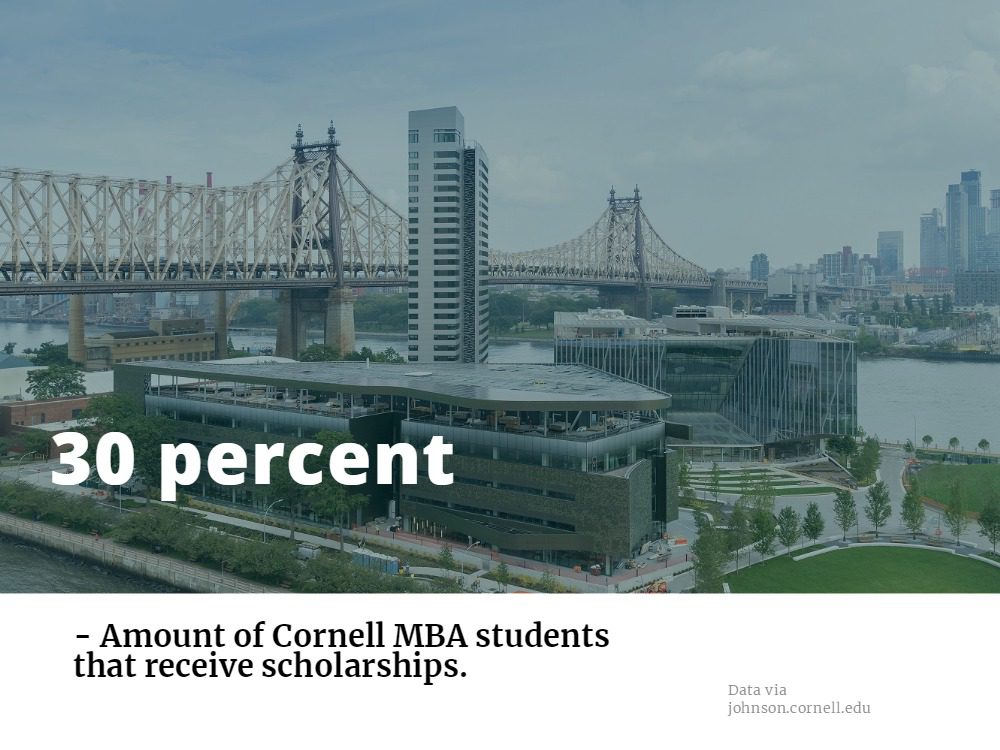
How to Begin Your MBA Search, Part I
You’ve weighed your options, and it seems like getting an MBA might be the best route to attaining your professional and personal goals. You’ve considered the expense and the time spent away from the workforce that an MBA requires, and you’re finally ready to begin your MBA search.
You’ve even read Philip Delves Broughton’s advice against attending business school in The Economist, and still find yourself cracking GMAT Study Guides and searching ROI figures in U.S. News & World Report. But even if you’re the most motivated future MBA, it is of utmost importance to ask yourself a number of questions as you embark on the process of applying and gaining admission to business school.
“Understand Where You Want to End Up Before You Even Begin”
Those are the wise words of Jeremy Schifeling, the founder of Break Into Tech and a veritable guru on the subject of how to find meaningful work in the tech world without engineering experience. A graduate of the University of Michigan’s Ross School of Business, Schifeling also speaks to his experiences there, adding that “way too many people show up on campus just because other people are doing the same. And without a plan, they walk away two years later, six-figures poorer but not six-figures wiser.”
The end lesson from Jeremy’s advice? Suss out what you want to do with an MBA, and don’t just go into a b-school program to make a lot money, or because everyone else seems to be doing so. Make a plan, and even if that plan changes, you’ll still have a leg up on many of your classmates.
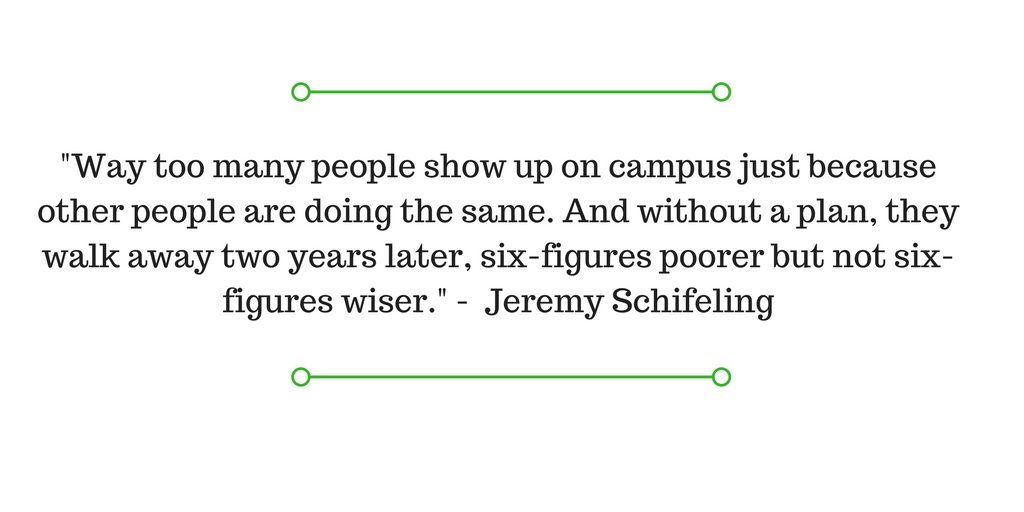
Figure Out What Programs Best Fit Your Plan
Let’s imagine that you know that you are interested in supply chain management. You could search around the web for schools that have special programs in logistics and supply chains, but that will only take you so far. Consultant Stacy Blackman notes, “some of our clients call up companies they are interested in working with to learn their opinions of target schools and where they recruit. If you are very specific about where you want to end up, this is a great idea.” Thus, if you’re certain about a career in operations and logistics, it might behoove you to contact companies like XPO Logistics or Werner Enterprises to see what b-school programs their management team recruits from.
If you’re not certain of exactly what career you want an MBA to lead to, but you have a general idea of the business field that you’d like to pursue, then it might be more reasonable to think about where you want to end up.
Location, Location, Location
Paul Bodine of Paul Bodine Consulting/Admitify says that it is absolutely necessary to ask yourself, “what geographies are essential to your post-MBA career and/or life goals?” The question can make all the difference in what schools you consider applying to—Bodine notes that “you can spare yourself the challenge of seeking admission to the top 10 schools if you have a defined region where you want to make your stand professionally and personally.” If you are wedded to working in traditional commodities markets (and bitcoin, surprisingly), then it wouldn’t make sense to stray far from the Chicago Mercantile Exchange, for example. If your search is geographically limited for reasons beyond your control, then find out which programs suit your needs best within that area. A tech business mind in the South might ponder schools in Knoxville or Atlanta, whereas a future lumber baron in the Pacific Northwest need look no further than Oregon State in Corvallis. There are opportunities everywhere, but it is up to you to find those that are most in line with your goals!
Stay tuned for part two of our series, coming soon!
Real Humans of the Syracuse Whitman Class of 2019
On the eve of its 100th anniversary, the student body of the Whitman School of Management at Syracuse University has become more diverse than ever before. Not only do most of the students from the Whitman Class of 2019 come from outside the United States, but the majority also earned undergraduate degrees from various non-traditional backgrounds, expanding what it means to be a Syracuse MBA.
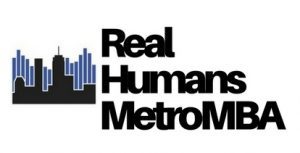
Among the Class of 2019, just under half (46 percent) of students in the program identified as female; well over the national average, according to GMAC data. Along with the 61 percent of students arriving from outside the United States, the Class of 2019 shares the unique distinction of being one of the youngest in the country, with an average age of just 25. In an academic field usually dominated by older professionals with rich, traditional backgrounds, Whitman has managed to disrupt many of the perceptions that come with an MBA.
The average GMAT score has been steadily rising over the past several years as well, jumping from 623 last year to 643 for the Class of 2019. But alongside rising test score averages, the prior work experience of the class has fallen, dropping from an average of 38 months to 28 months in just one year.
The expansive talent pool at Whitman, however, isn’t solely limited to the traditional full-time program. The ever-advancing online MBA, known simply as MBA@Syracuse, allows students to study many of the more traditional MBA specialties, including: accounting, business analytics, entrepreneurship, and finance, as well as supply chain management and marketing management. Not only that, Whitman states emphatically that there is no distinct difference in the curriculum of the online MBA and the full-time program. Rather, the only key difference is flexibility. Students in the online program can take classes from anywhere, with residencies offered in multiple cities outside of Syracuse.
To get a greater understanding of what it means to be a Syracuse MBA student, we spoke with several current students, including an Azerbaijan-born startup founder, an Indian-born analytical software expert, and an American dual JD/MBA prospect who is making a huge transition away from a career in Antarctica. Read on to see what’s in store for these students at Whitman and what life after an MBA may look like.
Caught: Why Business Schools Might Lie to Improve Rankings
School rankings from sites like Forbes or U.S. News & World Report are often a crucial factor for students before they decide where they should pursue a degree. Using a combination of rankings, standardized test scores, job placement after graduation, and tuition costs, among other crucial factors, a school ranking a quick and succinct look at the relative merits and weaknesses of MBA programs throughout the country—and the world.
There is a lot riding on these rankings: not only do perspective MBAs often make decisions about where to pursue their degree based on these reviews, but graduates can use these rankings to demonstrate the quality of their degree to future employers. With such high stakes, organizations like U.S. News that compile these rankings rely on the accurate reporting of data from each business school.
So, what happens if the information is inaccurate, or worse? Data like student satisfaction and post-graduate salary—which can be so crucial in informing a prospective MBAs choice of school or program—is reported directly from the business schools, which often presents a conflict of interest potential. With so much at stake, would a school ever lie to increase their spot in the ranking?
Unfortunately, it seems the answer is yes. Just last week, the Online MBA program at Temple University’s Fox School of Business—a program that was consistently ranked in the top spot in U.S. News’ Online MBA ranking—vanished from the list. According to the initial announcement, new information had revealed that just 20 percent of Fox students in the Online MBA program had actually submitted test scores, a number that had initially been reported at a perfect 100 percent. Since the formula used by U.S. News weighs test score averages more if over 75 percent of students have submitted them, this inaccurate reporting from Temple Fox would have given the program an undeserved boost in the school ranking.
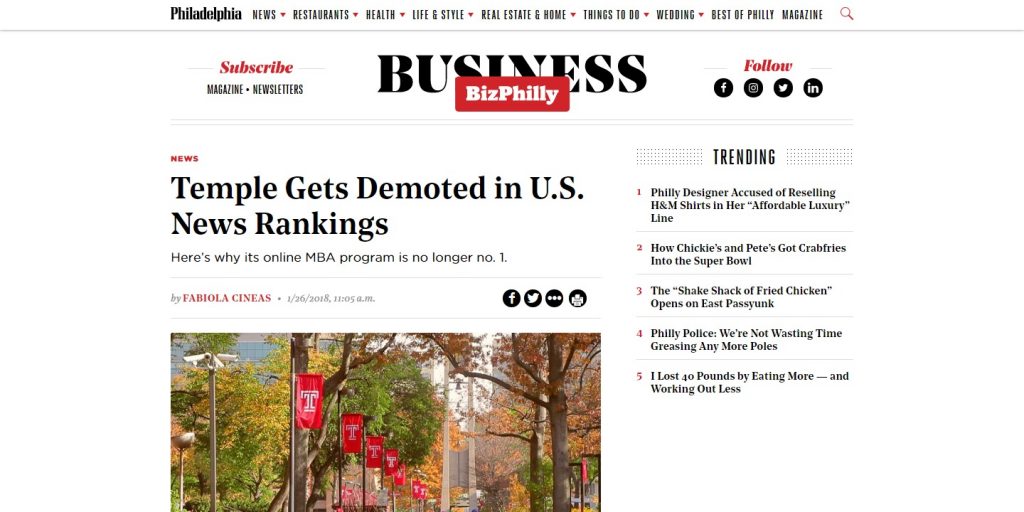
In the wake of Temple’s removal, questions continue to arise about the lengths schools go for good rankings/Photo via PhillyMag.
In the days since the initial announcement of Temple’s removal from the ranking, even more questions came out regarding the accuracy of Fox’s data. Further investigation found that Temple had reported 100 percent of students taking standardized admissions test for every year since 2014—a suspicious jump from the 25 and 33 percent that had been reported in the years prior. Since the test scores data submitted turned out to be inaccurate, it seems wholly possible that the data had also been misreported for the three years prior; the same years that Temple Fox held the top ranking for Online MBA programs.
This isn’t the first time it’s been discovered that business schools and even undergraduate programs have falsified or reported inaccurate data to boost its rankings. In 2013, Forbes was forced to remove four schools from its ranking of “America’s Best Colleges” due to inaccurate reporting: doctored SAT results from Bucknell University, false acceptance and graduation rates from Iona College, among others. In 2012, George Washington University lost its ranking on U.S. News’ “Best Colleges” list when it was discovered they were inflating the high school grades of their incoming students.
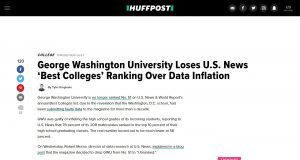
GWU was one of several schools in the past few years to submit false data for a rankings boost/via Huffington Post.
The problem may be even more far-reaching than some may suspect. In 2013, a survey of 576 college admissions officers found that 91 percent believed other colleges to be guilty of falsely reporting their admissions data. Even the school ranking creators themselves are shocked by this trend. In 2013, U.S. News editor Brian Kelly commented, “The integrity of data is important to everybody … I find it incredible to contemplate that institutions based on ethical behavior would be doing this.”
In 2005, the Association to Advance Collegiate School of Business (AACSB) took a deep look into this trend to examine why the issue of falsifying business school data might be so widespread. “Because rankings of full-time MBA programs are commonly presented under the label of ‘best b-schools,’ the public has developed a narrow definition about the breadth and value of business education,” the report states. Since most media rankings don’t consider factors like faculty research or doctoral education, MBA programs have become more likely to invest in more visible aspects of the program, such as facilities and marketing campaigns, which don’t actually deal with the quality of the degree. As a result, even high-quality programs may earn a lower media rank than they deserve based on the factors considered, adding pressure to do what it takes to earn a school ranking that matches what they perceive as the quality of the degree.
“Plenty of people apply to a school because it has reached the summit of a ‘best-of’ ranking, just as many people will see a movie or buy a book after it wins an award. That’s human nature,” Columbia Business School dean Glenn Hubbard told Fortune. “We want to experience the best.”
Whether or not placement in a school ranking truly represents the quality of a degree, it’s easy to see why the pressure is on for many admissions departments. A better school ranking can increase the number of applicants, providing for a more competitive, and diverse applicant pool, which creates a better quality admitted class. The cycle continues: success of these graduates can improve the possibility of future funding, providing more resources for the program and encouraging even more applicants to apply down the line.
“Rankings have become omnipresent in higher education, and they have enhanced the competition among institutions,” said Terry W. Hartle, senior vice president at the American Council on Education, in 2013. “And in any highly competitive environment, there is always a temptation to cut corners.”
For now, the Fox School of Business has been removed from the U.S. News Online MBA ranking. Concerns about false data continue to be evaluated, as organizations like AACSB continue to seek solutions and make recommendations for best practices when it comes to the collection and reporting of admissions data. In 2017, the AACSB publication “On Academic Rankings, Unacceptable Methods, and the Social Obligations of Business Schools,” suggested that schools and organizing bodies work together to find a method of data collection that includes “transparency, interpretability, and the empowerment of individual decision makers by whatever criteria truly suits their individual needs.”
For prospective students, its important to acknowledge this troubling but widespread trend as they make important decisions about where to earn a degree. While school ranking remains an easy way to compare programs against each other, students should consider not just the accuracy of the data but also the kind of factors reported in media rankings. While it seems possible that the number one program in a media ranking may not truly deserve that position, the real top program- the best for each individual’s needs and career goals—will always deserve first place.
Use These Key MBA Networking Strategies Before and After Graduation
In a competitive job market, current MBA students and recent graduates need to figure out how to stand out among their peers and make themselves attractive to potential employers. One of the most fundamental ways MBAs can maximize employment prospects, is to improve their networking skills.
Networking may be more than just a good employment strategy—it is actually a vital tool. According to Mark Brostoff, Assistant Dean and Director of Graduate Career Services at USC Marshall, “A successful job search begins and ends with successful networking. Networking should be one of the primary job search tools when pursuing a career,” he told MetroMBA.
With the advent of social media, networking is now an everyday part of our lives. Your internet presence is now a huge part of your job search. Brostoff highlights the unique value of maintaining the right kind of web profile: “Networking these days are [sic] both personal, as well as online, so maintaining a professional online appearance is extremely important before, during and after graduation.” Always keep in mind that while social media is a great way to communicate with friends and family, your online accounts are also a way of presenting yourself to potential employers.
The idea of MBA networking strategies may seem mystifying at first but as Terra Saltzman-Baker, the Director of Career Connections at UCSD’s Rady School of Management, assures, the idea is more ingrained within us than it may seem. “Quite simply, it means connecting with people. The more people that know you’re looking for a new job, or are changing your career focus, the more those around you may be able to assist.”
Successful MBA networking strategies are not only about reaching out to employers. An equally important move, and the first step in the process, is to inform those around you about career plans and ambitions. You never know how those in your social circle may be able to connect you to your ideal job. As Saltzman-Baker puts it, “it’s not just about the person you’re talking with, but those in their circle that they may think to connect you to.”
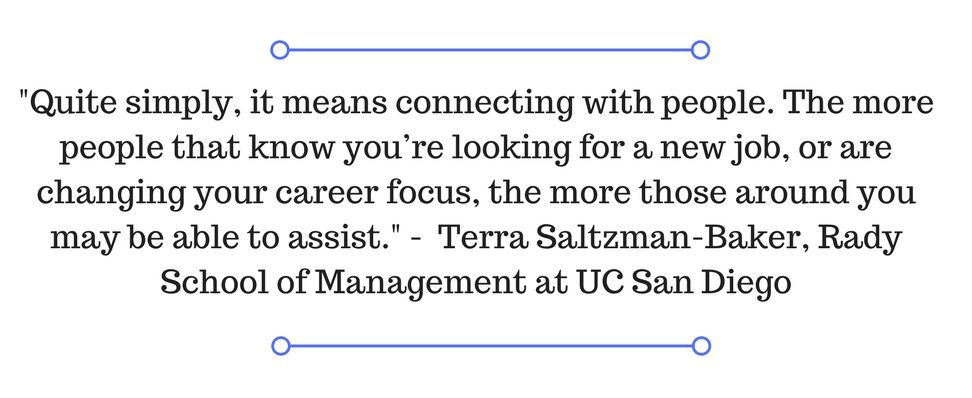
While it is a sensible move to use all of the online tools at your disposal, remember not to rely solely on the online communication that those platforms provide. Networking is all about building real relationships with others. At the heart of networking means valuing the quality of connections over quantity. Furthermore, connecting with others is not about simply finding those who can help you in your job search. Rather, the best networks benefit everyone involved. “Never mistake activity for progress,” says Dr. Janis Moore Campbell, Ph.D., the Director of Graduate Professional Development at Temple’s Fox School of Business.
“The best networking happens when people gather to learn from one another or to help one another,” she continues.
Stephanie Johnson, the Director of MBA/MS Career Services at Drexel University’s LeBow College of Business, also stresses that both parties must work together in order for the relationship to have any value. “Remember that networking is a reciprocal relationship, whenever possible, build mutually useful relationships where you aim to give before you expect something in return. In other words: “those who have given also receive.”
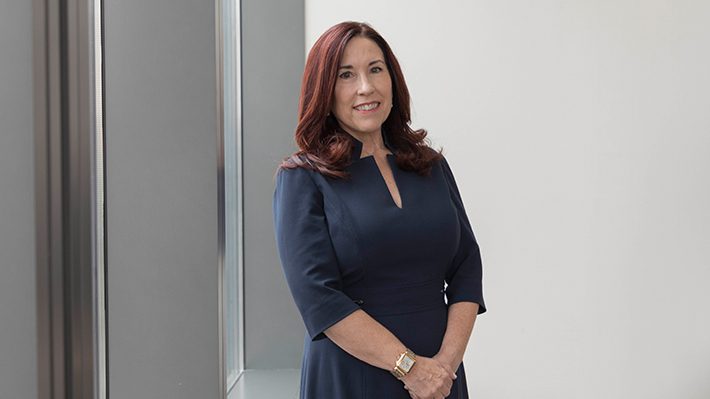
Stephanie Johnson, Director, MBA/MS Career Services – Photo via Drexel.edu
Perhaps one of the best MBA networking strategies is that it is never too early to start. The most successful networks are built before an MBA candidate begins their program, and then continue to evolve during and after school. Saltzman-Baker frames it simply: “The key is to start early. Don’t wait until you’re looking to make a change to use this strategy, but instead keep this up on a regular basis—you never know what may happen!”
Georgetown Jumps in Newest Financial Times Global MBA Ranking
Georgetown was one of the bigger winners after the Financial Times unveiled their newest Global MBA Rankings, with the McDonough School of Business earning 16th place in the U.S. and 30th in the world, up from 18th and 40th last year.
To create their rankings, FT evaluated each qualifying MBA program across a wide range of criteria. Much of the data is gathered from alumni and university surveys. According to McDonough, this year’s survey was completed by the class of 2014, which was the first cohort to complete the new school’s new MBA curriculum.
“As a school that prides itself on innovation and excellence, we are pleased to continue climbing in the Financial Times MBA ranking,” said Prashant Malaviya, senior associate dean for MBA programs. “At McDonough, we prepare our students to be principled, global-ready leaders, and we are happy to be recognized by a ranking that values international experiences, career success, and faculty scholarship.”
In addition to alumni data, FT takes the international character and diversity of the school into account for their list. McDonough’s 42-place jump in the International Experience Rank (4th in the U.S.) contributed to high marks in those criteria, as did the required Global Business Experience consulting project and the growing number of international career treks. The school’s faculty research rank is now 19th in the world, up 10 places from last year.
The Financial Times publishes seven rankings annually, relating to MBA, EMBA, Master in Finance, Master in Management programs and Online MBA programs, as well as non-degree executive education courses. They also issue a separate ranking of top European Business Schools. Check out FT’s interactive rankings tables to search for a school of interest, sort by selected criteria and filter by location.
Read more about this year’s FT rankings in our recent spotlight, courtesy of Clear Admit.
Finding the Best Return On Investment for Your MBA: Dallas
Choosing the right MBA program can feel overwhelming. With nearly 800 accredited business schools in the United States, the idea of wading through the information on every program is intimidating to say the least. A variety of features, such as a school rankings, internship opportunities, and an extensive alumni network may be huge factors where you choose to earn your master’s. But one of the most important variables to consider is a program’s return on investment (ROI). It is essential to pick a school with an enviable ROI, as this will ensure that the time and money you dedicate to earning your MBA are not for naught. Given the considerable cost of higher education, it is important to attend the school that will give you the most bang for your buck.
The Best Dallas MBA Return on Investment
Cox School of Business – Southern Methodist University
At the SMU Cox School of Business, students can expect an admirable rate of return on the cost of education. The tuition rate of $45,976 per year for the two-year program is among the most enviable in the U.S. The average graduating salary for MBA’s was $96,587, which is more than double the yearly cost of tuition. This school is also ideal for students hoping to global perspective, as students at Cox have the opportunity to participate in an international MBA exchange program, which allows them to continue their education in Latin America, Europe, Australia, or Asia. Simply put, SMU Cox doesn’t just provide one of the best Dallas MBA return on investment opportunities, but one of the best in the country overall.
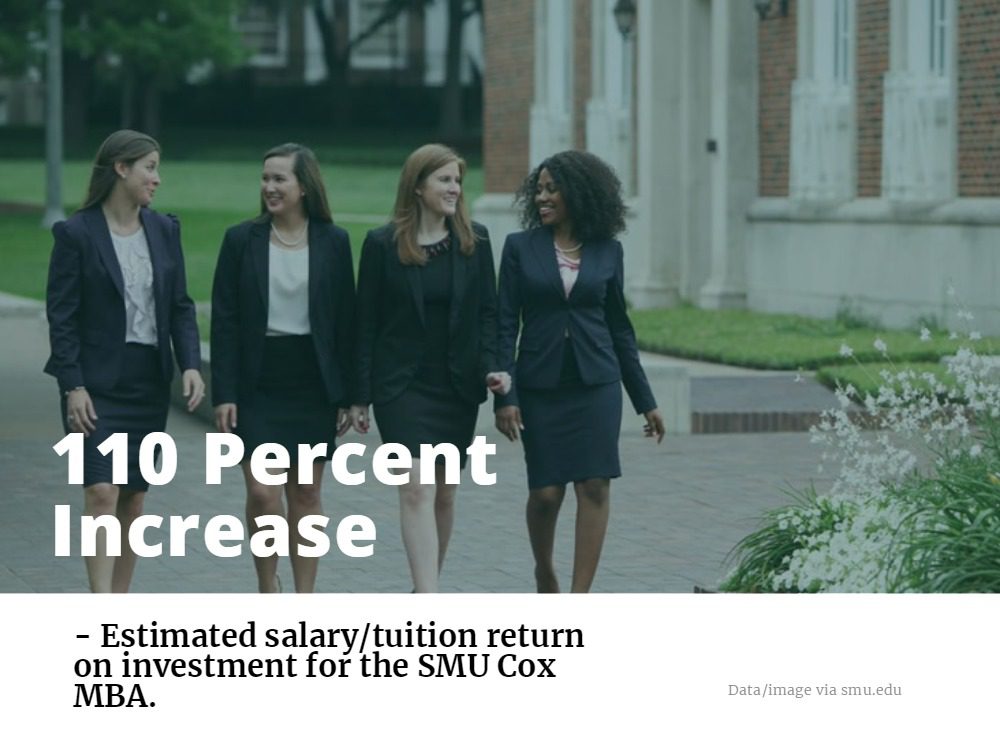
Hankamer School of Business – Baylor University
Baylor’s Hanker School of Business is another excellent option for students seeking a respectable ROI. The full-time program can span from 16 to 21 months, with a tuition of $20,597 per semester (over about three to four semesters, depending on course load and core requirements met during undergrad). According to Hankamer’s website, the average starting salary for MBA graduates in 2017 was $73,314. Additionally, Hankamer’s Career Management team is nationally-ranked, and can provide extra support for students seeking help with job placement.
McCombs School of Business – University of Texas at Austin
The MBA program at the McCombs School of Business currently costs $30,750 per semester, bringing the total tuition to about $123,000. The cost will is steeper for non-residents (closer to $189,000). Though the cost of tuition at McCombs is nothing to sneer at, neither is the reward. In fact, the most recent MBA class had an impressive average starting salary of $117,068. McCombs, which is also one of the largest business schools on this list, also has an extensive alumni network, which includes the CEOs of Southwest Airlines (Gary C. Kelly) and Heinz (William R. Johnson).
Naveen Jindal School of Management – University of Texas at Dallas
Like many of the schools we mentioned on this list, the Naveen Jindal School of Management has a solid track record when it comes to ROI. Tuition for the full-time MBA program is just $32,998 for in-state residents and $64,332 for non-residents. In addition to the reasonable cost, the school’s website states that 80 percent of students receive scholarships that cover an average of 45 percent of the total program cost. In 2017, U.S. News & World Report stated that the school’s MBA program, “… had the highest salary-to-debt ratio among ranked business schools.” According to the article, average starting salary for graduates (of those who were employed within three months of graduation) was $86,644.
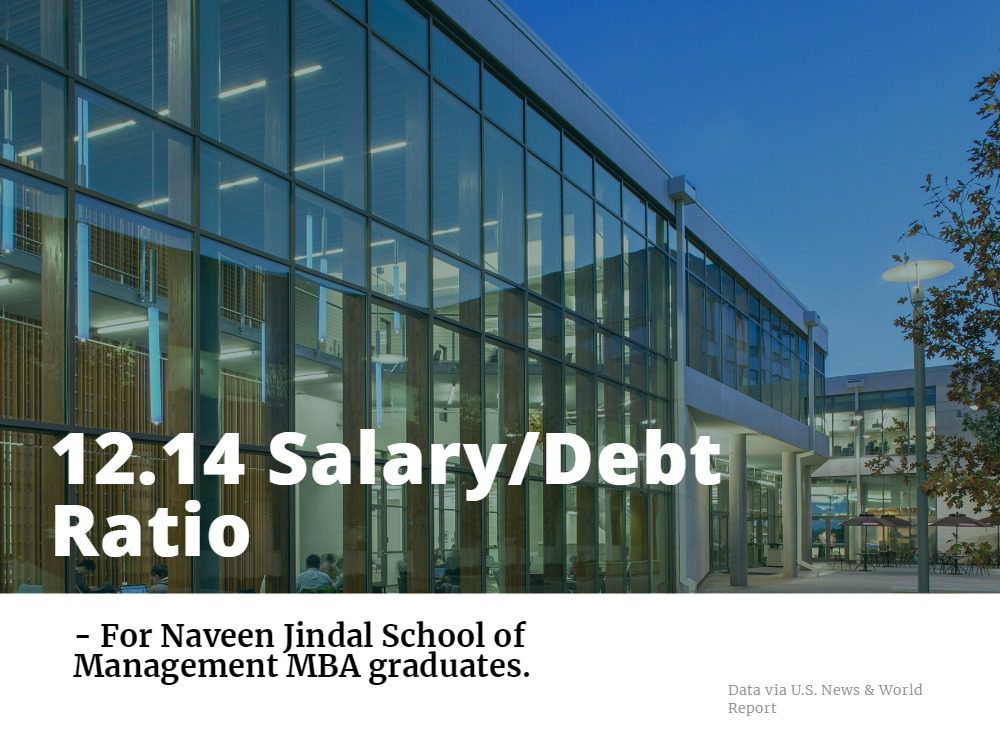
Neeley School of Business – Texas Christian University
At TCU’s Neeley School of Business, the average starting salary for the most recent graduates of the full-time MBA program was $93,093, surpassing the total tuition of $88,020. Moreover, Neeley boasts a 92 percent employment rate 90 days after graduation. Recent graduates have taken jobs at renowned companies like Ernst & Young and IBM. In addition to standard core classes, Neeley introduces a great deal of experiential learning into the curriculum. At the end of their first year, students participate in an Integrative Project that offers them the opportunity to apply their skills to real-world business obstacles via a week-long simulation.
Online MBA
USC Marshall Online MBA Program Structure
The USC Marshall Online MBA (OMBA) begins with a two-week course that includes both online and on-campus components—one week of online discussions, readings and assignments, followed by a six-day residential intensive of on-campus activities and coursework. The remaining five semesters is composed of fully online asynchronous and synchronous coursework.
Courses are offered during the fall, spring and summer semesters, but students can start the OMBA only in the summer or winter. The fall term begins in August and the spring term begins in December. If students choose to take a break, they can resume their studies the following semester. The program can be completed in just 21 months.
Curriculum
The USC Marshall Online MBA is a 51-credit program, offering an integrated curriculum comprising a residential intensive and five required cross-disciplinary courses. In each course, students acquire essential knowledge about the corresponding core subject areas—marketing, finance, management, accounting, entrepreneurship, and more—and gain a holistic understanding of how these disciplines fit together in an organization.
The program begins with The Role of the Manager, a two-week course that includes a six-day residential intensive component. While on campus, students engage in team-building activities including a competition that requires them to analyze and make recommendations to solve a business problem of a prominent company or organization.
The five remaining courses are fully online, each spanning 15 weeks. They are the Fundamentals of Business, Opportunity Recognition and Implementation, Managing Inside the Firm, Managing Outside the Firm, and Business Environment and Leadership. This advanced integrated curriculum is the cornerstone of the Marshall Online MBA and supports our primary goal of developing students into leaders ready to succeed in the global marketplace.
These online courses consist of award-winning asynchronous and synchronous coursework. Asynchronous activities include video presentations, moderated discussion boards, and a range of other virtual learning experiences. Synchronous coursework consists of an array of real-time interactions including live online class sessions, collaborative virtual activities, and one-on-one meetings with faculty.
A defining element of the Marshall Online MBA is its use of a full range of technological learning tools to create an engaging online learning experience and provide students with practical skills, such as virtual collaboration, that apply to today’s global, digitally-driven business environments.
Live online class meetings take place two to three times per week, on any day of the week, and last between one and two hours. The schedule accommodates working professionals and varies each semester.
Online MBA Rankings
• U.S. News & World Report: 5
Class Profile
The average student GPA is 3.2 and the average GMAT and GRE scores are, respectively, 630 and 314 . The average age of students entering the full-time MBA program right now is 28 years, and they have an average of five years’ work experience upon entering the program. Female students make up 40 percent of the typical class.
Career Statistics
The average salary of recent USC Online MBA graduates is around $132,844.
Tuition, Scholarships, and Financial Aid
The approximate overall cost of the Marshall Online MBA is $109,858. It covers tuition, textbooks and course materials, and the one-week on-campus session including lodging. It does not include meals, travel to and from the USC campus, or student health insurance (which may be waived).
Marshall offers a limited number of scholarships to students in the Online MBA program. Additionally, many employers participate in tuition assistance programs and there are several loan options available for students.
Three types of loans are available to finance the OMBA—Federal Stafford Loans, Federal Direct Graduate PLUS Loans and private student loans. It is recommended that U.S. citizens or permanent residents apply for Federal Stafford Loans first, because they offer favorable interest rates and origination fees. International students are not eligible for this loan program.
Admissions
Applicants to USC Marshall Online MBA program must have a four-year undergraduate degree or equivalent. At least two years of professional work experience is desired. Applicants must submit a completed application form, all college transcripts from degree-granting and non-degree-granting institutions, a current résumé, and three letters of recommendation, with at least one being written by a professional contact. The school also requires applicants to complete an essay about their leadership experiences and goals, and provides them with the opportunity to submit five additional documents to convey other relevant information to the Admissions Committee. The Committee will invite some applicants to interview via web conference. GMAT or GRE scores (GMAT is preferred, however these will be waived for 2020-2021 due to COVID-19) and a nonrefundable $155 application fee also are required. A few applicants may be granted a GMAT waiver. More information on GMAT waiver requirements can be provided by an enrollment counselor.
International applicants may need to submit TOEFL or IELTS scores.
Application deadlines for USC Marshall Online MBA August 9, 2021 start date:
Round One – Feb. 25, 2021
Round Two – April 15, 2021 (Scholarship Deadline)
Round Three – June 3, 2021 (Final Deadline)
USC Marshall Online MBA FAQ’s
How has the university coped with the pandemic?
Events are predominantly online to keep students and staff safe.
What MS programs does USC offer?
The university offers multiple Master of Science programs including finance business analytics, and social entrepreneurship.
Are dual degrees a possibility with the USC Online MBA?
Yes, they include MBA/MS in Systems Architecting and Engineering, MBA/Master of Social Work, and MBA/MS in Industrial and Systems Engineering.





